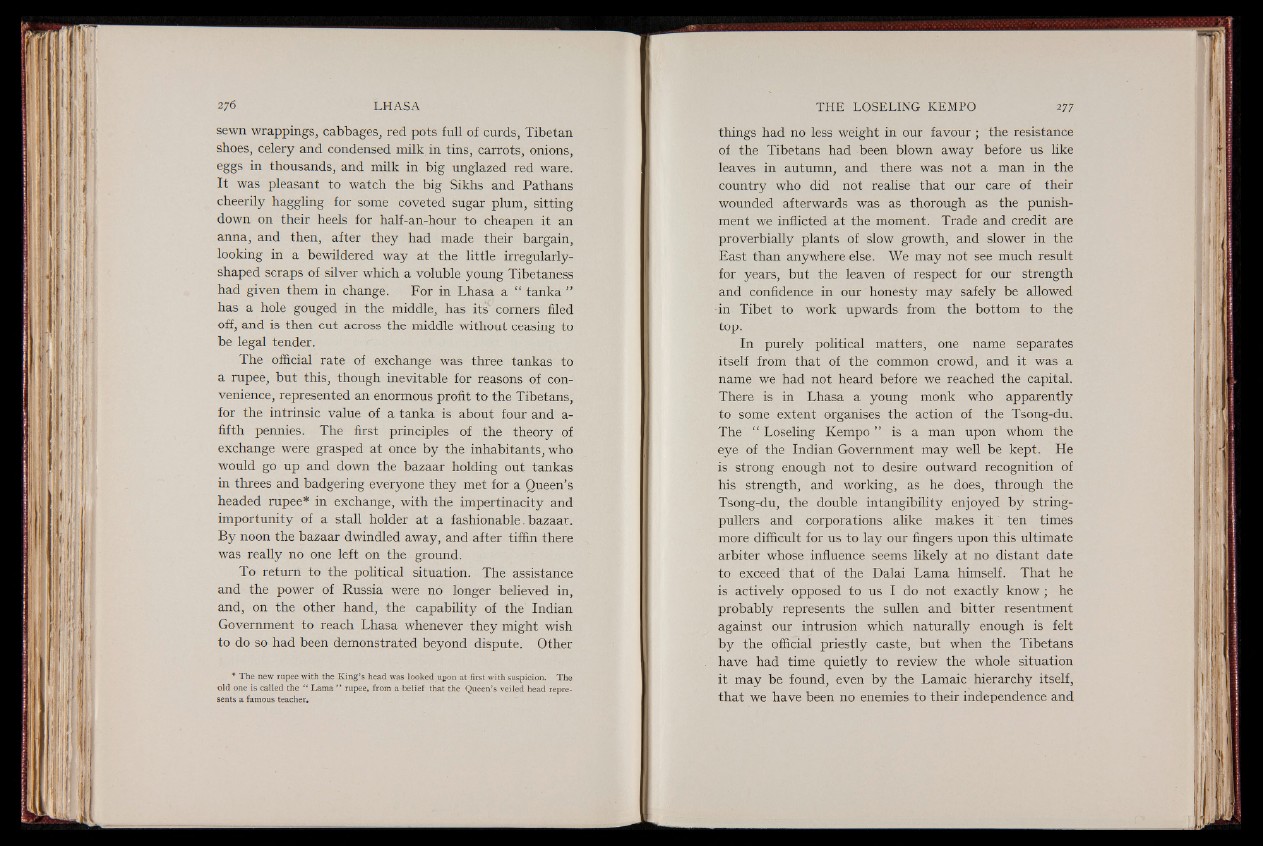
sewn wrappings, cabbages, red pots full of curds, Tibetan
shoes, celery and condensed milk in tins, carrots, onions,
eggs in thousands, and milk in big unglazed red ware.
It was pleasant to watch the big Sikhs and Pathans
cheerily haggling for some coveted sugar plum, sitting
down on their heels for half-an-hour to cheapen it an
anna, and then, after they had made their bargain,
looking in a bewildered way at the little irregularly-
shaped scraps of silver which a voluble young Tibetaness
had given them in change. For in Lhasa a “ tanka ”
has a hole gouged in the middle, has its corners filed
off, and is then cut across the middle without ceasing to
be legal tender.
The official rate of exchange was three tankas to
a rupee, but this, though inevitable for reasons of convenience,
represented an enormous profit to the Tibetans,
for the intrinsic value of a tanka is about four and a-
fifth pennies. The first principles of the theory of
exchange were grasped at once by the inhabitants, who
would go up and down the bazaar holding out tankas
in threes and badgering everyone they met for a Queen’s
headed rupee* in exchange, with the impertinacity and
importunity of a stall holder at a fashionable. bazaar.
B y noon the bazaar dwindled away, and after tiffin there
was really no one left on the ground.
To return to the political situation. The assistance
and the power of Russia were no longer believed in,
and, on the other hand, the capability of the Indian
Government to reach Lhasa whenever they might wish
to do so had been demonstrated beyond dispute. Other
* The new rupee with the King’s head was looked upon at first with suspicion. The
old one is called the “ Lama ” rupee, from a belief that the Queen’s veiled head represents
a famous teacher.
things had no less weight in our favour ; the resistance
of the Tibetans had been blown away before us like
leaves in autumn, and there was not a man in the
country who did not realise that our care of their
wounded afterwards was as thorough as the punishment
we inflicted at the moment. Trade and credit are
proverbially plants of slow growth, and slower in the
East than anywhere else. We may not see much result
for years, but the leaven of respect for our strength
and confidence in our honesty may safely be allowed
in Tibet to work upwards from the bottom to the
top.
In purely political matters, one name separates
itself from that of the common crowd, and it was a
name we had not heard before we reached the capital.
There is in Lhasa a young monk who apparently
to some extent organises the action of the Tsong-du.
The “ Loseling Kempo ” is a man upon whom the
eye of the Indian Government may well be kept. He
is strong enough not to desire outward recognition of
his strength, and working, as he does, through the
Tsong-du, the double intangibility enjoyed by string-
pullers and corporations alike makes it ten times
more difficult for us to lay our fingers upon this ultimate
arbiter whose influence seems likely at no distant date
to exceed that of the Dalai Lama himself. That he
is actively opposed to us I do not exactly know ; he
probably represents the sullen and bitter resentment
against our intrusion which naturally enough is felt
by the official priestly caste, but when the Tibetans
have had time quietly to review the whole situation
it may be found, even by the Lamaic hierarchy itself,
that we have been no enemies to their independence and